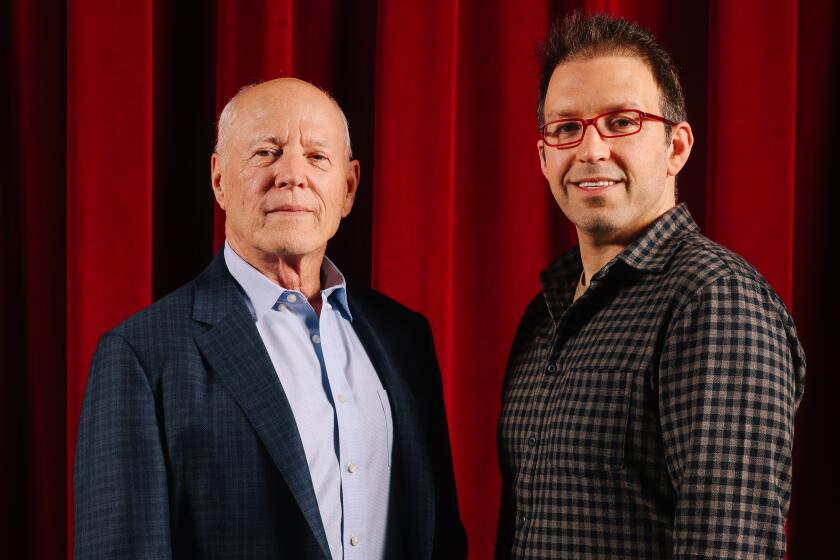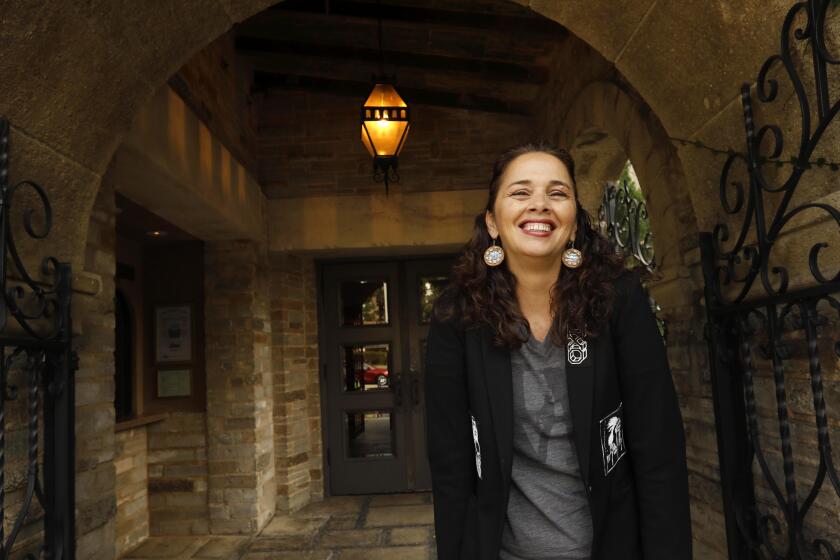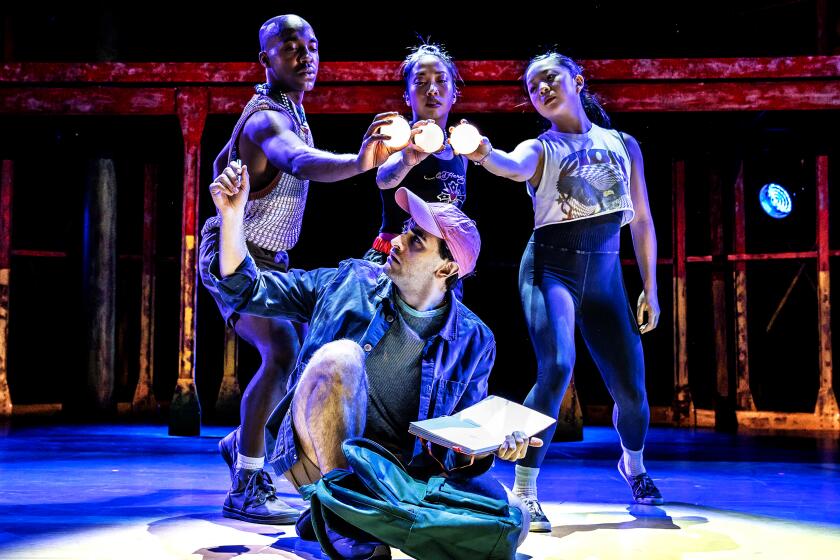An American cast rewrites ‘History’
“The History Boys,” Alan Bennett’s Tony-winner about eight English high school lads preparing for their entrance exams to Oxford and Cambridge, opened Wednesday at the Ahmanson Theatre in a production that hews closely to the original staging. Well, with one notable exception: The play has been recast almost entirely with American actors. How well you accept these British accents and attitudes will no doubt influence whether you consider this eccentric comedy of ideas more like yucky kidney pie or yummy bread pudding.
If you can excuse the extremely choppy beginning, with careening vowels and body language that seems foreign to both sides of the pond, you might find yourself becoming slowly absorbed in the peculiar world Bennett has concocted. Supposedly set in the Thatcherite ‘80s in a rundown industrial town, the play is a patchwork of the past (harking as far back as the playwright’s own pre-Oxford days) and the present -- a milieu that belongs as much to the author’s imagination as anywhere else.
There’s another reason to be lenient about the slightly shaky geography on display: The Broadway production, which transferred from London’s National Theatre under the direction of Nicholas Hytner, featured an ensemble anchored by Richard Griffiths (Uncle Vernon in the “Harry Potter” movies) that simply couldn’t be bettered.
Hytner’s 2006 film version with the same cast was able to document the depth of the actors’ portrayals, although it couldn’t capture the singular charm of the piece as it played out before a rapt audience.
This latest and admittedly less enthralling stage incarnation, directed by Paul Miller (who has also staged the play’s U.K. tour), follows Hytner’s spare and brisk dramatic plan and even incorporates Bob Crowley’s Broadway set, which re-creates the fluorescent and plastic ambience of a not-so-elite secondary school. Ben Taylor’s rapid-fire music video footage that fleshes out the story between scenes on a giant hanging screen has been re-shot with the new cast, but the overall look of the work hasn’t changed.
To be frank, the description “second-hand” looms dangerously large. Fortunately, as the action evolves, the rhythm of the dialogue flows more freely and the jokes land with less labor. Do the actors settle into their roles sufficiently to makes sense of some of Bennett’s strained plot points? With the exception of Seth Numrich, who plays the manipulative class hunk Dakin, and Charlotte Cornwell as Mrs. Lintott, the lone female voice we encounter on the faculty, the answer, sorry to say, is not quite.
Still, Bennett’s play remains a sui generis delight for adults who want to think as much as feel when they’re at the theater. Steeped in a tradition of socially concerned, hyper-articulate comedy that harks back to George Bernard Shaw, “The History Boys” is also the product of a literary sensibility devoted to what we, at a loss for categories, call “miscellany.”
Bennett’s body of work encompasses vaudeville revue (“Beyond the Fringe”), dramatic monologues (“Talking Heads”), historical drama (“The Madness of George III”), farce and autobiographical sketches. All of these influences can be detected in “The History Boys,” which examines a cultural trend that extends beyond modern education.
The topic, one perhaps most familiar to campaigning politicians, involves the acceptance of slick, careerist packaging over quiet authenticity as a strategy for success. A black-and-white issue, it would seem. Yet Bennett unschematically explores the individual personalities, with all their quirks and quizzical motivations, behind the viewpoints.
The reliably wonderful Dakin Matthews plays Hector (the role Griffiths won a Tony for), a passionate, willfully unpragmatic teacher who wants his students to develop a regard for art and literature that isn’t superficial or self-serving. His pedagogy is challenged by Irwin (Peter Paige), a boyish new hire brought in by the ambitious headmaster (a sitcom-y H. Richard Greene) to help these talented youths catapult themselves into the Oxbridge big leagues.
Irwin urges the boys to adopt polemical views on their exams to ensure they’ll stand out. “History nowadays is not a matter of conviction,” he says. “It’s a performance. It’s an entertainment. And if it isn’t, make it so.”
Much of our theatrical pleasure revolves around the classroom exercises Hector devises to generate a love of learning for learning’s sake alone. We see the young men practice the subjunctive and conditional tenses in French by feigning transactions in a brothel. We listen attentively as they recite poetry by W.H. Auden and Thomas Hardy, giggle as they enact moments from “Now, Voyager” and glow as Posner (Alex Brightman), the love-struck gay Jewish boy, croons “Bewitched, Bothered and Bewildered.”
Hector is not just an inspiring teacher, however. He’s also a lonely, regretful, sexually confused man whose peculiarities of behavior, which shouldn’t be divulged in a review, profoundly affect how the ensuing con- flict unfolds.
Matthews, who’s so moving in his emotionally wrought discussion of the way literature can be as if “a hand has come out and taken yours,” seems confounded by his character’s more questionable extracurricular proclivities. And the clumsy scene in which he’s called on the carpet by the headmaster fails to enlighten us.
Paige brings to light the repression underlying Irwin’s mix of diffidence and driven determination. Too bad his accent and manner wobble, but then, of the principals, only Cornwell, who was born in England, has the external trappings comfortably under control.
All is forgiven, however, when class is in session and the production jolts to life. Of the students, Brett Ryback as Scripps, the God-worshiping boy who offers narration and piano accompaniment as needed, and Numrich’s struttingly charismatic Dakin are the most vividly convincing, while Brightman’s Posner, forever mooning over Dakin, has the funniest lines.
The “sheer calculated silliness,” as Hector describes his less traditional teaching practices, of Bennett’s provocative meditation coaxes us into contemplating what we’re meant to take away from our school days, that fate-changing period of our always-present past.
--
‘The History Boys’
Where: Ahmanson Theatre, 135 N. Grand Ave., Los Angeles
When: 8 p.m. Tuesdays through Fridays, 2 and 8 p.m. Saturdays, 1 and 6:30 p.m. Sundays. Call for exceptions.
Ends: Dec. 9
Price: $20 to $80
Contact: (213) 628-2772, www.center theatregroup.org
Running time: 2 hours, 40 minutes
More to Read
The biggest entertainment stories
Get our big stories about Hollywood, film, television, music, arts, culture and more right in your inbox as soon as they publish.
You may occasionally receive promotional content from the Los Angeles Times.







